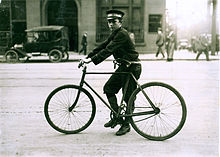


In many English-speaking countries, a telegram messenger, more often known as a telegram delivery boy, telegraph boyortelegram boy was a young man employed to deliver telegrams, usually on bicycle. In the United Kingdom, they were employed by the General Post Office; in the United States, they worked for Western Union or other telegraph companies.
Telegram boys became popular in the United Kingdom after the General Post Office took over control of inland telegraphs from the railways and private telegraph companies. Many of the boys employed by these services to deliver telegrams transferred to the Post Office.
In some respects, the life of a telegram boy was not unlike that of someone in military service. They were expected to behave in a manner befitting one who wore the uniform of the Queen, and were required to complete a daily drill. Messengers, at least in London, were required to carry a blue book of instructions at all time, and produce them whenever they were ordered to. Rules included specifications on appearance, dictating that messengers must keep themselves clean and their hair short, and be courteous whenever speaking to anyone. The rulebook also sought to control their behavior, forbidding messenger boys from sliding down staircase handrails; from smoking, gambling, or playing cards while in uniform; and from entering public houses except to deliver messages.[1] From 1915 to 1921, morning exercise was added to these requirements.
During the 1930s the Post Office introduced motorcycles. This started in Leeds where boys aged 17 were allowed to volunteer for training, but only with the permission of their parents. However, following the success of this, motorcycles were soon introduced elsewhere in the country. The fleet was comprised almost exclusively of BSA B33-1 250cc motorbikes which boys were expected to ride at an average of 15 mph. Later 125cc BSA Bantams were used. These were finally replaced with smaller Raleigh and Puch models.
During its heyday in the 1930s, the service was delivering an average of 65 million telegrams per year; however, the service was running at a loss, estimated at £1 million annually.
Throughout the 1960s and 1970s the use of telegrams had dropped significantly, with around 10 million sent annually in the mid-1960s. Consequently, the Post Office took the decision in 1977 to abolish the service. The service continued for a few years and was briefly operated by British Telecom after it split from the Post Office. British Telecom announced on 19 October 1981 that the telegram would be discontinued,[2] and it was finally taken out of service on 30 September 1982 after 139 years in the United Kingdom.[3]
The telegram as such was superseded by the British Telecom Telemessage service, introduced in October 1982.[3] Messages were dictated over the telephone or sent via telex, printed, and delivered overnight by first class post in a distinctive envelope guaranteed for next day delivery, rather than by messenger.[3]

Telegraph boys were boys under the age of 18 who carried telegrams through urban streets and who were generally not union members.[4] The job came with inherent hazards. Boys were expected to "scorch" their bicycles in urban traffic by violating traffic laws in order to reach their destinations more quickly. At night, the boys might be required to enter the red light districts in connection with their job duties.[5]
As of October 2023[update], Israel Post still offers a domestic telegram service via its website.[6]
|
| |
|---|---|
| |
| General and technical |
|
| Utility and slow recreation |
|
| Sports-related cycling and fast-paced recreation |
|
| Health, safety and infrastructure |
|
| Other |
|
| Lists |
|
| |